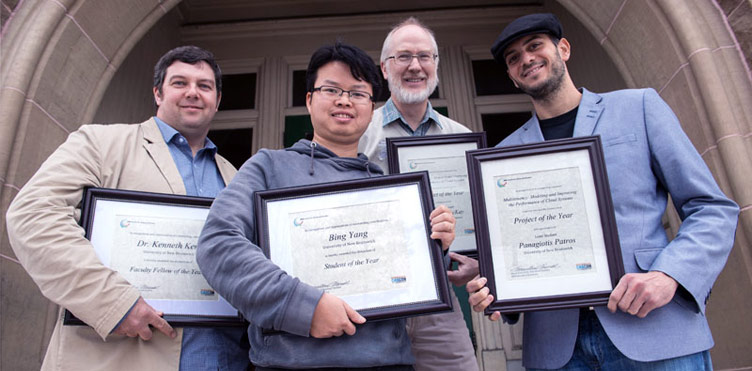
Last fall, UNB doctoral students, alumni, faculty and staff received top awards at IBM’s 26th annual CASCON – an international conference on computer science and software engineering -- held in Markham, O.N.
Each year, more than 1,000 developers, researchers and innovators gather at CASCON to share their work, collaborate with one another and identify industry trends. Competing with universities across the country, UNB was the only one to win awards in three separate categories.
Having the first faculty of computer science in Canada, it’s no surprise that UNB is a leader and innovator in the field.
UNB is home to the IBM Centre for Advanced Studies – Atlantic (CASA), a research-based institution dedicated to promoting and cultivating collaborative research between IBM and UNB. Since 2010, master’s and doctoral students, research assistants and faculty members have worked to improve the java runtime environment – the foundation for many of IBM’s software products.
Success at this year’s CASCON didn’t happen overnight.
“This came after five years of hard work and dedication,” says Kenneth Kent, director of CASA and professor in UNB’s faculty of computer science. “It was the perseverance and dedication of all the people at the centre that made this happen. It also helped that we had a large team effort with everyone within the group supporting the team.”
PhD Candidate Bing Yang was inspired to move from Beijing to New Brunswick to pursue his doctoral degree after learning about UNB’s involvement with IBM. He received Student of the Year at CASCON for his work on synchronizing access to data, which allows multiple accesses to data simultaneously without compromising accuracy.
“Bing is a hard-working student who has shown real dedication to his work,” says Kent.
Yang’s work at CASA has led to four disclosures in progress for IBM patents. It is extremely uncommon for a company to identify four different pieces of a student’s work as intellectual property they want to protect.
“The calibre of students at UNB is equal to that of other leading institutions,” says Kent. “Our strength is in the community that we have established where the students, faculty and staff feel part of a team. When you are working on large projects such as this you need a team approach to succeed.”
PhD Candidate Panagiotis Patros (MCSc’14), originally from Athens, Greece, came to UNB in 2012 to complete his master’s degree in computer science. He is the lead graduate student on the team that won Project of the Year.
The team’s work enables many software programs to operate simultaneously on the cloud without sacrificing their security and efficiency. With research assistant Dayal Dilli (MCS’13), who was recently hired by IBM in Fredericton, Patros created a mathematical model that measures and predicts the performance of these programs.
Stephen MacKay, senior research assistant in UNB’s faculty of computer science; Kent; and IBM developers Michael Dawson, Peter Shipton and Tom Watson each played an integral role in bringing the project to life.
As director of CASA, Kent has been involved in 18 projects with the centre, published 31 papers, worked on 14 patents that are currently in progress with IBM and supervised 25 graduate students since 2010.
His passion in driving collaborations with academics and other partners to conduct research that will “significantly impact the advancement of science in research areas that are strategic in shaping the next generation of the internet” earned him the Faculty Fellow of the Year award.
“Since becoming director, the real highlight for me was at the CASCON conference when everyone, including the students attending from UNB, were taking note of the impact and significance of the work being conducted at UNB,” says Kent. “When faculty from other prestigious universities or developers from within other divisions of IBM were approaching UNB students and indicating they had examined their work and were interested in how they solved various technical challenges, the students felt proud and confident of their contributions and hard work. Seeing that in a student is priceless.”